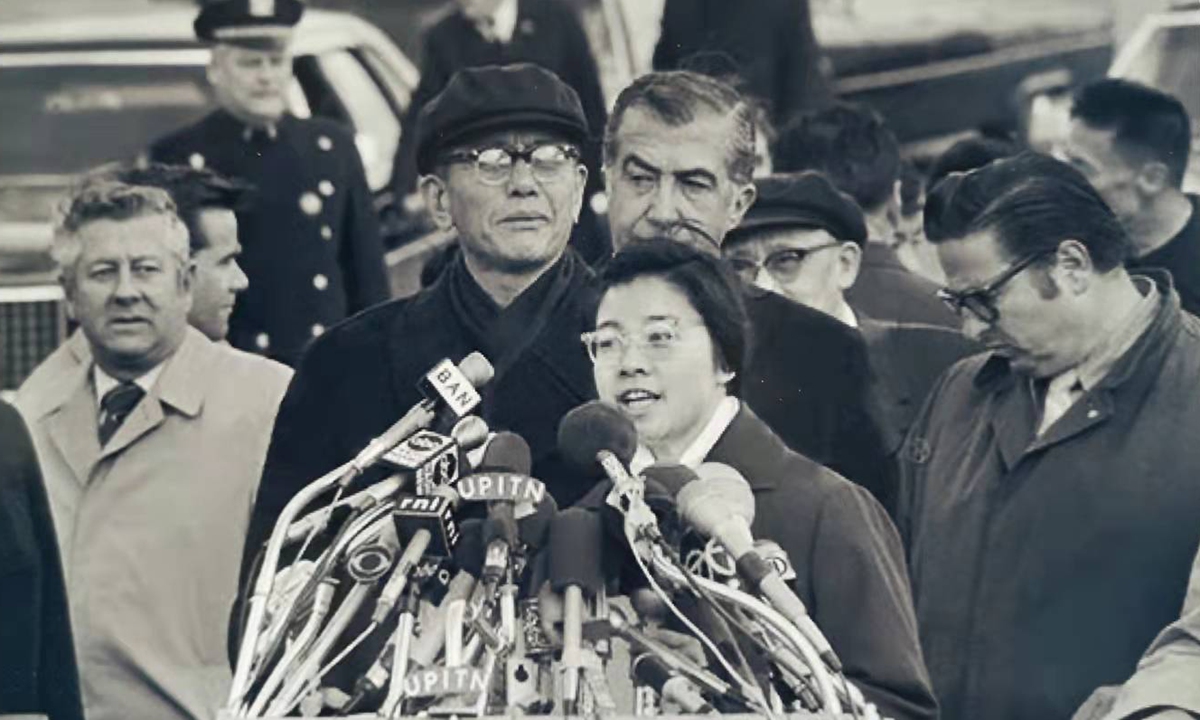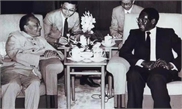IN-DEPTH / IN-DEPTH
How African representatives ‘carried’ PRC into the UN

The interpreter Tang Wensheng translates Chinese delegation head Qiao Guanhua's speech at the Kennedy International Airport on November 11, 1971. Photo: Courtesy of Tang
Chairman Mao Zedong once said, "It was our fellow developing countries that 'carried' the People's Republic of China into the United Nations." The word "carry" aptly captures the profound friendship between China and other developing countries, especially those from Africa. How did China's return to the UN in 1971 reflect a popular hope by the majority of developing countries?
At the 1,982nd and 1,983rd plenary meetings of the 26th session, the General Assembly heard welcome statements to the delegation of the People's Republic of China. Representatives from many African countries stand one after another to welcome the Chinese delegation, expressing their trust in and encouragement to the Chinese people. Tang Wensheng, the main English interpreter for the PRC delegation to UN General Assembly in 1971, recalled such remarkable moments.
Delegates of different countries came up to offer hearty congratulations, surrounded by photographers tirelessly snapping away. The general debate of the 26th General Assembly had long been concluded, and what attracted so many to the conference hall that morning was a special session to welcome the delegation of the People's Republic of China, according to Tang.
"The Hungarian representative delivered a speech in Putonghua, and the Chilean representative quoted many poems by Chairman Mao Zedong," Tang said.
"It commenced at 10:30 am with welcoming remarks from the former president of the General Assembly, Adam Malik, followed by a stream of speeches country by country that continued from morning till 6 pm. As the session went on, more and more representatives signed up to offer remarks," Tang recalled.
"Due to time limits, some were not able to do so in person but had their speeches included in the conference records. The speeches were full of passion."
Some African countries including Tanzania and Egypt gave a warm welcome to us because they thought China's restoration to its lawful seat at the UN was long overdue.
"If you looked through the conference records, you would realize these countries' feelings and what their thoughts and expectations were for China's restoration to its lawful seat at the UN," Tang noted.
The presence of the delegation of the People's Republic of China was a moment of great political and historical significance, marking the end of the old, outdated politics of the past. Since then, the United Nations has been a new organization. It will never be the same again, the representative of Zambia said in his address.
The representative of Tanzania said they were particularly pleased to see China regaining its rightful place in the UN. They believed that the UN regarded China as a very valuable member that supports the right of peoples to self-determination and independence, and opposes all forms of oppression and injustice, noting that Tanzania admired the heroic struggle of the Chinese people for their dignity and independence.
These were fruits of the famous UN General Assembly Resolution No. 2758, which brought about a thorough and fair settlement of China's representation in the United Nations politically, legally, and procedurally.
On October 25, 1971, the 26th UN General Assembly rejected the "important question" resolution proposed by the US with 59 votes against, 55 votes for, and 15 abstentions. The General Assembly proceeded to pass with an overwhelming majority of votes (76 votes for, 35 votes against, and 17 abstentions) a resolution sponsored by Albania, Algeria, and 21 other countries, which decided to restore all the lawful rights of the People's Republic of China in the United Nations and immediately expel the representatives of the Kuomintang clique from the United Nations and all its affiliated agencies.
"China was a typical developing country during that time, but it still did its best to help whenever possible. The construction of the Tanzania-Zambia Railway, for instance, was a difficult endeavor at the time given that China's economy was also quite poor. A great many resources were spent on the project, and a few lives were lost as a result," Tang suggested.


